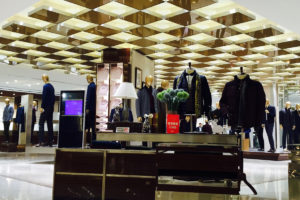 I remember it like it was yesterday. It was a Black Friday morning and we had lines of customers jockeying for position at 16 front end cash registers, two pharmacy registers, a jewelry counter register and 2 registers at our electronics counter. Sure, there were a lot of people, hundreds if not a thousand at one time but we were handling it. I had our Loss Prevention team monitoring cameras, checking receipts at the front doors and walking the floor with “Security” jackets on to deter theft and prevent fights. The store management team had good plans in place for replenishing freight on the floor and giving employees breaks. I had worked with the Store Manager to control the flow of customers into our building and all had gone off without a hitch, no pushing, shoving or fights. I even had a number of police officers at our front doors aiding us with crowd control. We had really planned for every contingency, or so we thought. The one thing that we had not planned for happened and it was a major problem, our register system went down! The audible sighs, snide remarks, and expressions of anger and frustration were heard in one collective voice. All of our managers jumped into action trying to reboot registers and get systems back online. Ever so slowly we got things moving again but it was a nightmare and it made us realize the scary truth, we had not really prepared for everything as well as we thought we had. A number of shopping carts had been abandoned with Black Friday specials in them and no salesfloor staff available to re-shelve the merchandise.
I remember it like it was yesterday. It was a Black Friday morning and we had lines of customers jockeying for position at 16 front end cash registers, two pharmacy registers, a jewelry counter register and 2 registers at our electronics counter. Sure, there were a lot of people, hundreds if not a thousand at one time but we were handling it. I had our Loss Prevention team monitoring cameras, checking receipts at the front doors and walking the floor with “Security” jackets on to deter theft and prevent fights. The store management team had good plans in place for replenishing freight on the floor and giving employees breaks. I had worked with the Store Manager to control the flow of customers into our building and all had gone off without a hitch, no pushing, shoving or fights. I even had a number of police officers at our front doors aiding us with crowd control. We had really planned for every contingency, or so we thought. The one thing that we had not planned for happened and it was a major problem, our register system went down! The audible sighs, snide remarks, and expressions of anger and frustration were heard in one collective voice. All of our managers jumped into action trying to reboot registers and get systems back online. Ever so slowly we got things moving again but it was a nightmare and it made us realize the scary truth, we had not really prepared for everything as well as we thought we had. A number of shopping carts had been abandoned with Black Friday specials in them and no salesfloor staff available to re-shelve the merchandise.
Can stores prepare for every contingency? Quite honestly, no but that is not to say there should not be a significant amount of time spent planning for holidays and holiday foot traffic. The hard part is knowing what you should plan for and have a contingency plan if something “breaks” which will most certainly happen. What kind of things can you prepare for?
- Are you hoping for increased foot traffic or planning for it? Hoping is wishful thinking something will magically occur. Small and medium-size retailers have to make good things happen. Big Box retailers are planning months in advance for what their “Doorbuster” items will be for Black Friday. They do bulk purchases of merchandise that will be one-time sellers. LCD televisions are one of the big promos I see each year. These are often not top of the line name brands and they are bargain priced to bring in foot traffic. Get people in the door and hit them with other sale items and promotions. The nasty surprise with this type of gimmick? What do you tell your customers when you run out? Were you fair in how you advertised quantities would be limited, no holds would be permitted, first come/first serve and no rain checks or substitutions will be given out? Be clear in your advertising and let customers who are waiting for that item know how many there really are. You may give out a ticket to each person in line who is waiting for that “Doorbuster” so no one else feels “duped”. You can save a lot of headaches for yourself.
- Test your equipment. Have a professional come in and test your point of sale registers, your computers, and even your electronic article surveillance pedestals and deactivation pads. Do you normally run two registers during the year? Consider having a third for an increase in customers or as backup if one of your two breaks.
- Are you intending to run your holiday season with the same number of employees you have all year? That can be a scary decision. If you are planning out your sales and promotions you will see more customers. Failing to have enough staff means you are not giving the level of customer service you need to and people will be put-off with poor assistance, abandon merchandise and leave the store. Not adding staff also means you will run your full-time crew ragged and they may quit. Holiday seasons can be stressful enough without feeling like you’re stretched too thin by your boss.
- Finally, consider promotions for each of the major holidays coming up in the final quarter of the year. Candy giveaways for those who celebrate Halloween, a drawing for a turkey dinner for Thanksgiving, or a raffle promotion to get people into your building for Christmas shopping, Hanukkah, Kwanzaa, etc.
Holiday shoppers can make your financial year but you must be prepared. Careful planning will pay off in the end. Don’t be scared to step outside your comfort zone to reach new customers and drive profitable year-end sales.
 With Thanksgiving right around the corner, I thought it would be an appropriate time for me to ask the employers out there how thankful are you for the staff you have? I don’t mean are you just thankful you have people who work for you in a general sense but how thankful are you for what they bring to the workplace every day? Maybe you have never thought about it like that. I’m certain you are thankful that Bobby showed up on time today or Mary Jane rang up customers without a customer complaint. But have you ever looked at how you express your thanks to your team? Maybe your attitude is that you pay them and that should be enough. Perhaps you give your employees a birthday card when their birthday rolls around each year. But is that really sufficient? Is it fair for your employees to expect more from you in terms of recognition?
With Thanksgiving right around the corner, I thought it would be an appropriate time for me to ask the employers out there how thankful are you for the staff you have? I don’t mean are you just thankful you have people who work for you in a general sense but how thankful are you for what they bring to the workplace every day? Maybe you have never thought about it like that. I’m certain you are thankful that Bobby showed up on time today or Mary Jane rang up customers without a customer complaint. But have you ever looked at how you express your thanks to your team? Maybe your attitude is that you pay them and that should be enough. Perhaps you give your employees a birthday card when their birthday rolls around each year. But is that really sufficient? Is it fair for your employees to expect more from you in terms of recognition? I watched a video shared with me by a former Loss Prevention Manager colleague. The video showed three subjects enter a retail store and all appeared to be wearing masks and at least one looked to be carrying a rifle of some type. There were several employees at the front entrance when the subjects walked in and one of the employees seemed to say something to the one who was carrying what I will refer to as a rifle. The video was not the greatest and the camera is pointing into the store from the exterior door so for the most part, the backs of the perpetrators are seen.
I watched a video shared with me by a former Loss Prevention Manager colleague. The video showed three subjects enter a retail store and all appeared to be wearing masks and at least one looked to be carrying a rifle of some type. There were several employees at the front entrance when the subjects walked in and one of the employees seemed to say something to the one who was carrying what I will refer to as a rifle. The video was not the greatest and the camera is pointing into the store from the exterior door so for the most part, the backs of the perpetrators are seen.
 By Bill Bregar, CEO Loss Prevention Systems, Inc.
By Bill Bregar, CEO Loss Prevention Systems, Inc. How often does it happen? You are in front of your television watching your favorite college football team playing a game and your spouse starts talking to you about their day or what you need from the grocery store. Then suddenly the conversation takes a nasty turn and you are asked for input about the conversation you weren’t really engaged in. The textbook reply, “Yes Dear” or
How often does it happen? You are in front of your television watching your favorite college football team playing a game and your spouse starts talking to you about their day or what you need from the grocery store. Then suddenly the conversation takes a nasty turn and you are asked for input about the conversation you weren’t really engaged in. The textbook reply, “Yes Dear” or We’ve all been there, we are on our way to work and the next thing you know you come to a standstill. Cars backed up as far as you can see and no one is going anywhere. The clock is ticking away and you begin to worry knowing you are going to be late getting to the office. You look for a side street to try to get out of the mess then, someone with a little bit of guts and a four-wheel drive truck pulls onto the shoulder of the road and speeds by everyone to get to their destination. Everyone gets to where they are going but some people are determined not to let obstacles get in their way and they take the fast track to get there. They went the same route they just overcame the obstacles that would get in their way.
We’ve all been there, we are on our way to work and the next thing you know you come to a standstill. Cars backed up as far as you can see and no one is going anywhere. The clock is ticking away and you begin to worry knowing you are going to be late getting to the office. You look for a side street to try to get out of the mess then, someone with a little bit of guts and a four-wheel drive truck pulls onto the shoulder of the road and speeds by everyone to get to their destination. Everyone gets to where they are going but some people are determined not to let obstacles get in their way and they take the fast track to get there. They went the same route they just overcame the obstacles that would get in their way.
